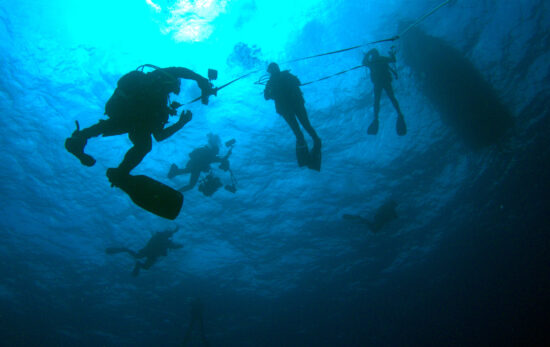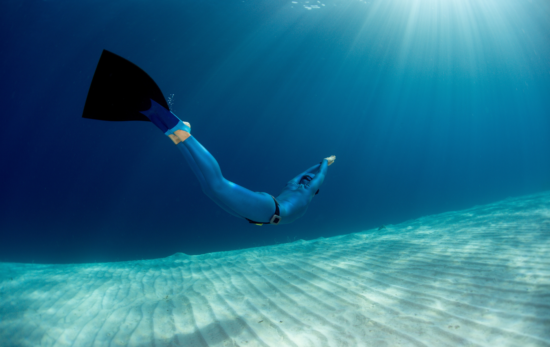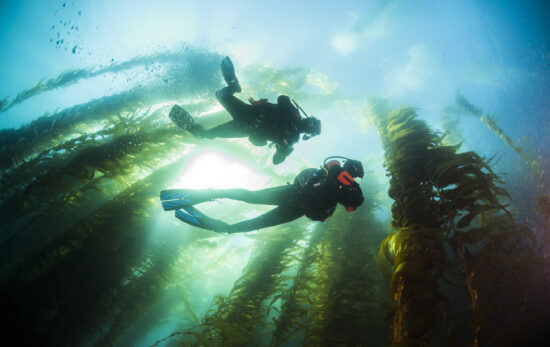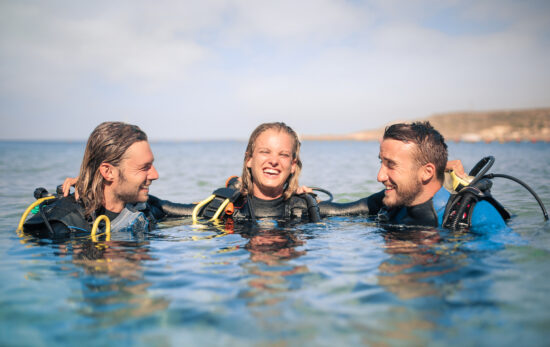If you’re thinking about becoming a diver, summer is a wonderful time to do so. The weather is generally better, the waters are warmer and the seas calmer. These conditions are ideal to get scuba certified.
The first step is to book your PADI Open Water Diver Course with a verified PADI Dive Center. In doing so, you can be assured you’re receiving top training from qualified dive professionals.
They will guide you as you begin this exciting journey underwater. Still, there are some tips that can make your PADI Open Water Diver Course go more smoothly. We want to share those with you here!
1) Booking Tips
You can learn to dive near home, on vacation or a mix (books at home and dives on vacation). There are many considerations and ways to prepare for your course. What is best for you will depend on how much time you have, how you learn best, and what dive center you’d prefer to book with.
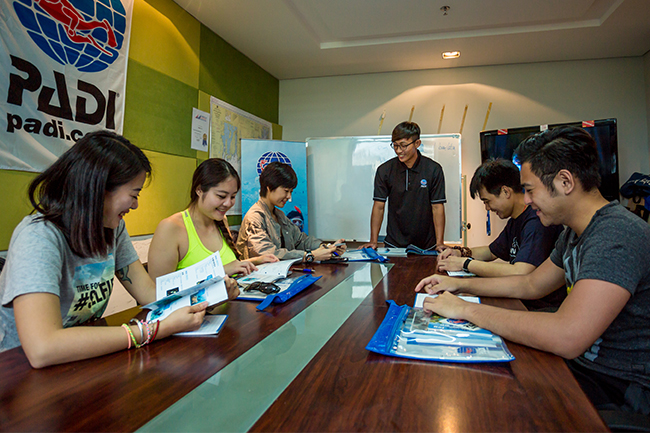
One tip is to do your open water certification dives in a location similar to where you expect to be diving a lot. That way, you will train and learn tips for conditions you will likely encounter early in your diving career. For example, if you plan to go to the Caribbean every year to dive, you might want to get certified there or in the Florida Keys, because the warm, tropical coral reef environments are similar.
2) Be Prepared & On Time
Make sure to check all your gear before you begin your course. Especially with rented gear like wetsuits, put everything on to make sure it fits. If anything doesn’t or seems damaged, call your dive shop to arrange an exchange.
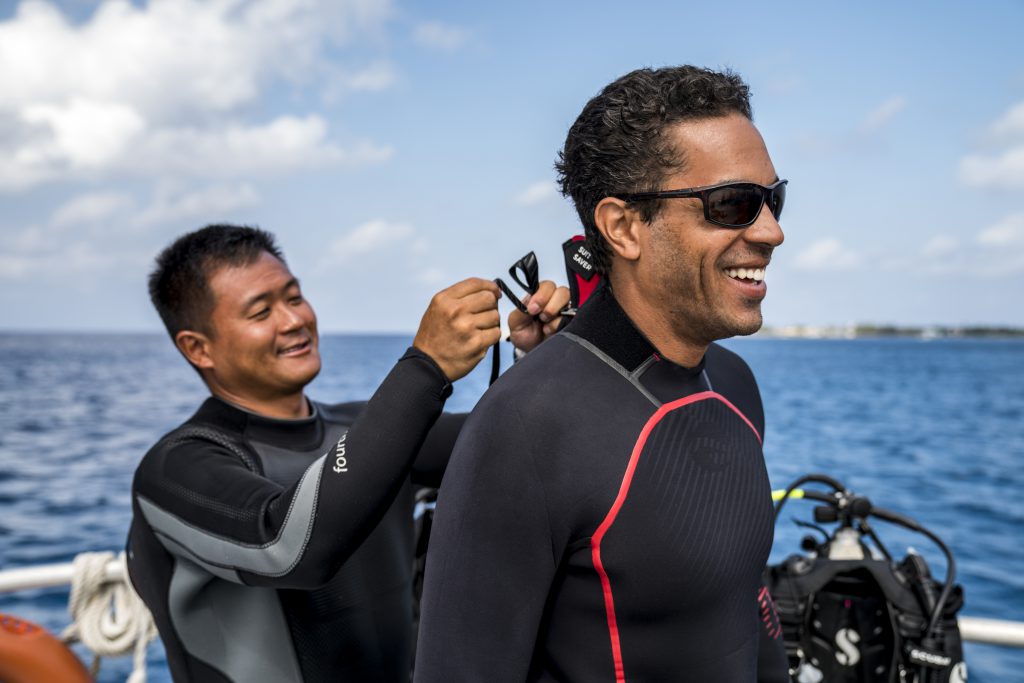
Second, be on time. If you are late, that can stress you, your instructor and your classmates out. Leave time for parking, getting lost and getting your gear out.
Finally, have all your forms ready. You will need to fill out a Diver Medical Form to ensure you are fit to dive. This may require you to get a physician’s signature. If you are completing your Open Water Diver course while traveling, it might be difficult to find a doctor on the go. Therefore, plan ahead. Call your dive shop to ask them what forms you will need and if they can recommend a local doctor. Or, fill out your forms at home if you can.
3) Show Up Ready: Physically & Mentally
Scuba diving is a rigorous sport that takes concentration, skill, stamina and quick thinking. Therefore, when you’re about to start your PADI Open Water Course, make sure you show up ready.
If you’re traveling, arrive a few days in advance, so you aren’t jetlagged or worrying about missed flights or missing baggage.
Physically, get enough sleep the night before your course begins. Take any medicines you need (especially if you get seasick). Eat healthily and avoid oily and heavy foods that can cause indigestion. You can try these exercises to stay fit for diving.
The sun can be brutal! Don’t forget to bring water and to hydrate throughout your training. Also, bring reef-safe sunblock or clothing to keep you from developing sun-stroke or dehydration.
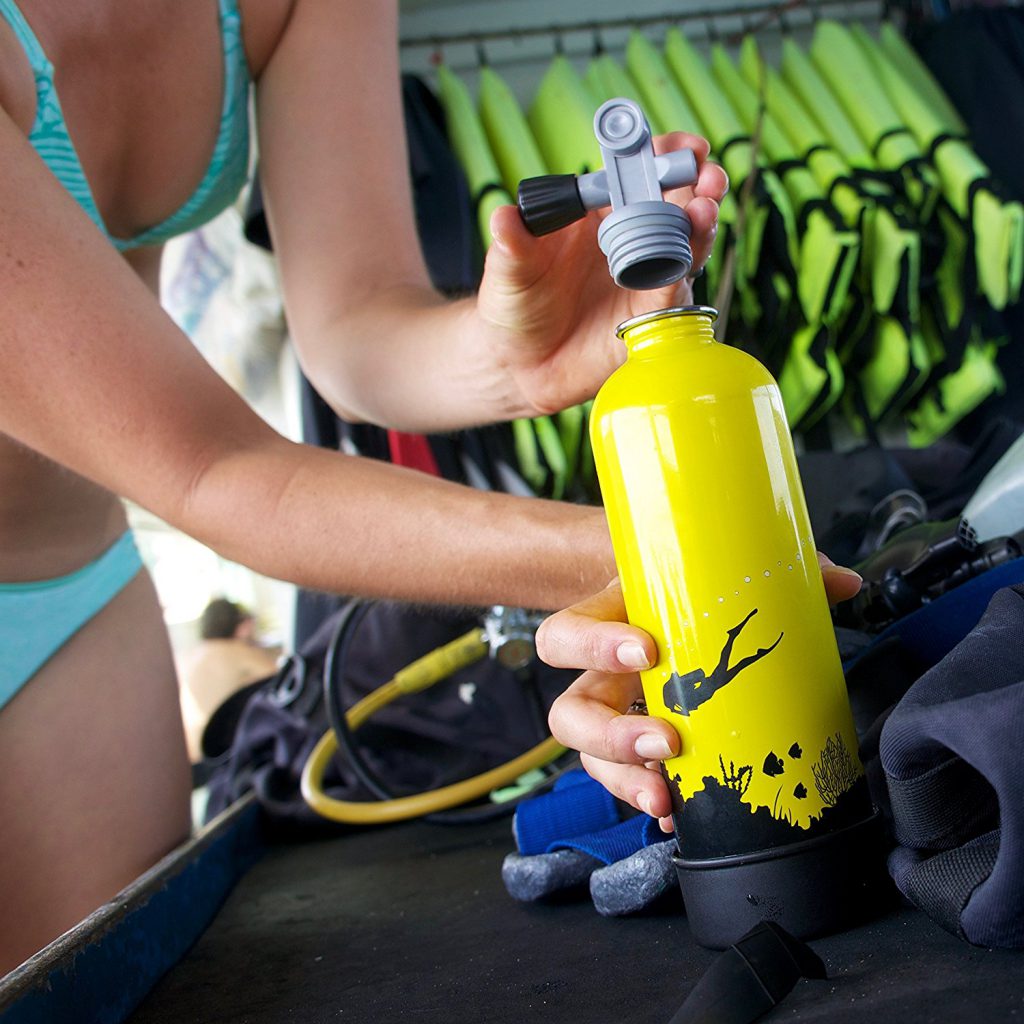
Mentally, be present during all aspects of your course. Don’t bring work or outside issues in with you. Make sure to pay attention because the basics of your training will determine how safe and competent of a diver you will become. The better you understand these concepts and skills, the more fun you will have underwater.
4) Pay Attention and Ask Lots of Questions
Everything you learn in your PADI Open Water Course is taught for a reason. Watch your instructor and any videos closely. Try to remember the little details, such as how to do a buoyancy check at the surface or why we don’t put our dive masks on our heads (hint: it’s a distress signal). You’ll be glad you were listening and watching if and when real-life situations occur that test these exact skills.
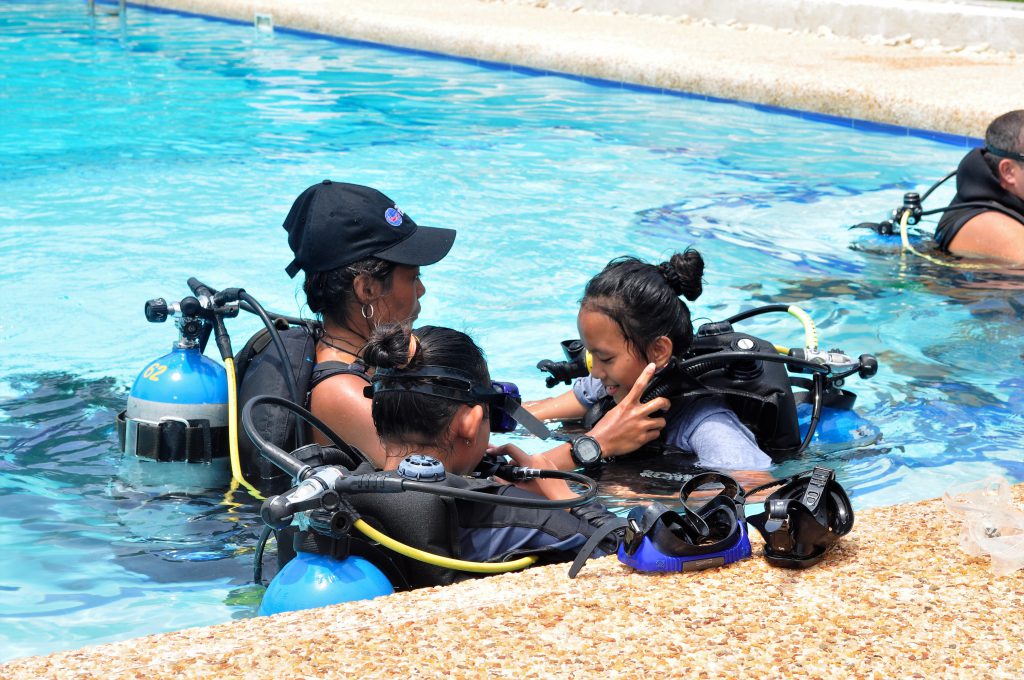
If you don’t understand something or want to know why things are done a certain way, ask your instructor or divemaster! They are professionals and there to help. They will be your best source of knowledge.
The same goes for any of your gear. If you don’t understand how something works, speak up. Good gear keeps divers safe. When you understand how different parts of your gear work, you can more safely use them to explore the underwater world.
5) Keep An Open Mind
For most, learning to breathe underwater is a brand new experience. If this is you, congrats on challenging yourself to try something awesome and new! Nevertheless, new knowledge or skills may be can be confusing, frustrating and/or difficult. Don’t give up!
Instead, come to your classroom, pool sessions and open water dives with an open mind and a willingness to learn. If you’re experiencing difficulty with a particular skill or concept, ask your PADI instructor for further help.
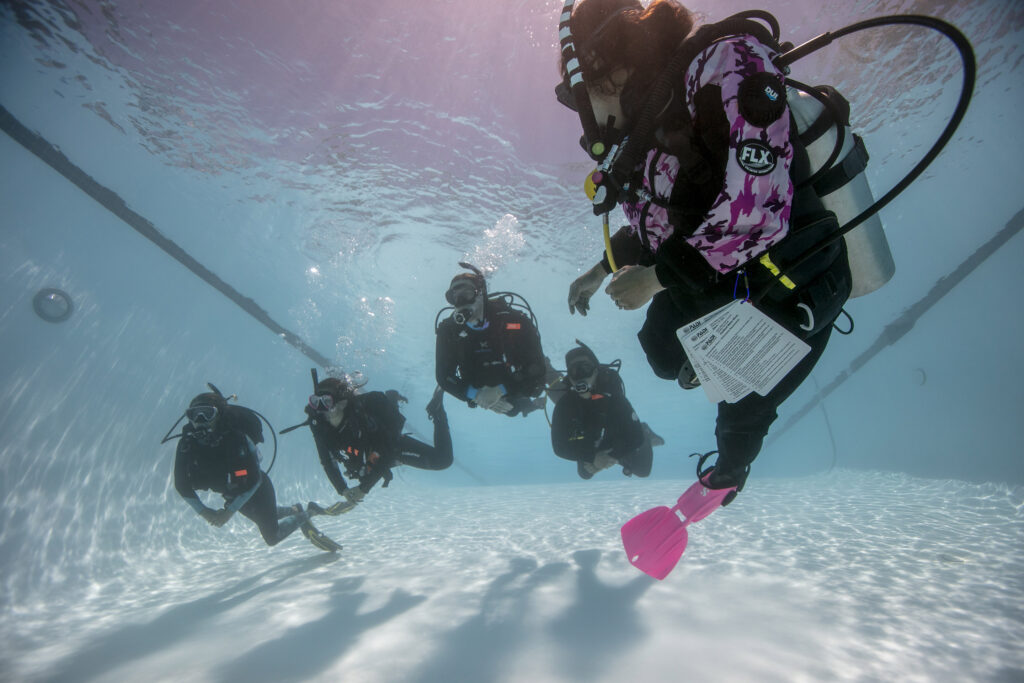
Everyone is a beginner at one point, and there is nothing to feel negative or shy about. In all likelihood, someone else is also probably confused, and your question might help them, too. And, don’t settle with not knowing or understanding something. You never know when you will need the skills you learn in your Open Water Course while diving, but it will happen.
6) Don’t Be Competitive
When you’re in a class setting, it can be tempting to compare yourself to other students. Don’t! People learn differently and at different rates. For example, the course workbooks might come easy to your neighbor but confuse you. However, in the pool, you might nail your regulator recovery, while that same neighbor can’t get it right. Rather than compare and feel bad, you both should remember that it’s not a race and it’s not a competition.
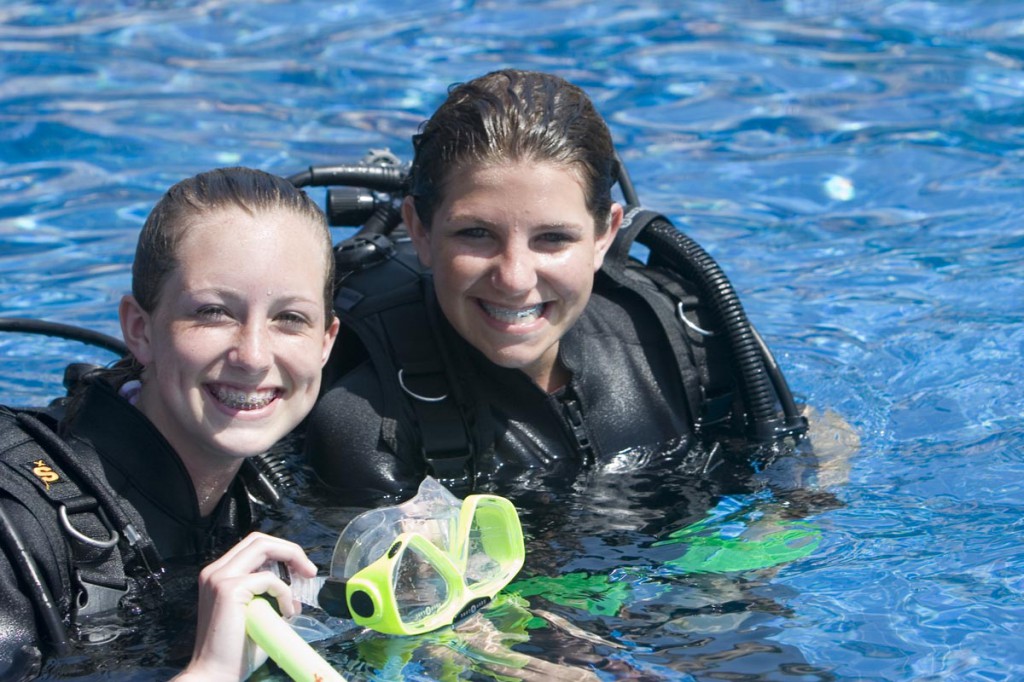
Instead, remind yourself that diving is a very individual sport. You can and should always be near your buddy, in case anything happens. However, your dive experiences will improve as you become more comfortable with the skills. You have a responsibility to yourself to make sure you learn how to safely and competently scuba dive.
For the purpose of your Open Water Course, focus on truly mastering your new skills and knowledge. Don’t worry about how quickly you learn or complete a new skill. Instead, make sure you truly understand how to do it, so that you can do so on your next dive without hesitation.
7) Relax & Have Fun!
Many people are nervous before their course or in performing specific skills. If you can, remind yourself to stay calm. Everything is helping you become a more confident and skilled scuba diver. Personally, I thought about how lucky I was to learn how to explore our underwater world. That helped me overcome my fear and feel excited.
It can also help to talk to other divers or locals who have completed dives where you will be certified before. Ask them questions so you know what to expect.
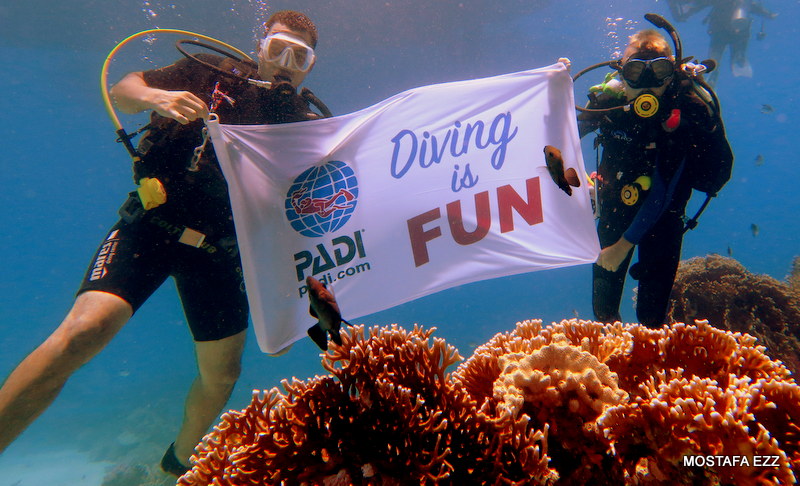
Lastly, give yourself a pat on the back. After your Open Water Diver course, you will join the best community in the world. We’re ready to jump in with you. So, what are you waiting for?


